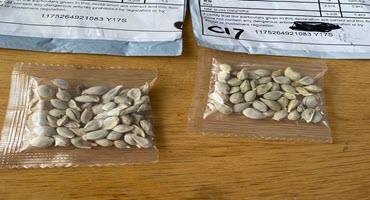Don’t plant the seeds, the agriculture department says
By Diego Flammini
Staff Writer
Farms.com
Packages of unsolicited seeds are showing up in mailboxes across Michigan.
On Sept. 13, the Department of Agriculture & Rural Development issued an advisory to residents about the packages and how to handle them.
“If you receive unsolicited seeds from another country, do not open the packaging or plant the seeds,” Mike Philip, director of the state’s pesticide and plant management division, said in the advisory. “USDA testing of these packages has identified hundreds of varieties of seeds, ranging from noxious weeds, to cannabis, to a wide array of vegetable and flower seeds.”
The ag department also warns against throwing the seeds away.
Instead, contact the department for assistance.
The seeds are found in envelopes, sometimes indicated as jewelry, and originating in China or elsewhere.
The packages may be part of what’s known as a “brushing” scam.
The scam involves sellers using an address “to make it appear as though (the recipient) wrote a glowing online review of their merchandise, and that (the recipient is) a verified buyer of that merchandise,” the Better Business Bureau said. “They then post a fake review to improve their products’ ratings, which means more sales for them.”
This wouldn’t be the first time Americans received unsolicited packages of seeds.
In 2020, at least 27 state ag departments had to issue warnings to people about the goods.

Washington State Department of Agriculture photo.
That year, about 16,000 specimens had been received across the U.S., including 5,000 species of seeds. In total, shipments came from about 44 countries, Louisiana newspaper The Advocate reported in October 2020.
Some recipients did plant the seeds.
In the summer of 2020, Doyle Crenshaw from Arkansas planted the seeds and tended to the plant.
“We brought them down here and planted the seeds just to see what would happen,” he told 5News. “Every two weeks I’d come by and put Miracle Grow on it and they just started growing like crazy.”
The seeds grew into a plant resembling squash with white fruit and orange flowers.
The USDA encourages people who receive these seed packages to contact their State Plant Health Director “to determine if further action is needed to protect agriculture,” the USDA says